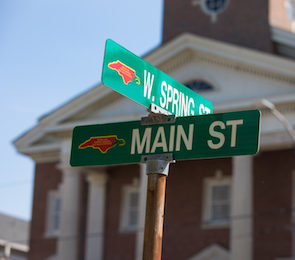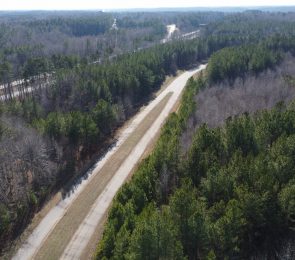Information on appealing tax values is provided on this page for informational purposes only.
Please contact the Granville County Tax Office at (919) 693-4181 or 141 Williamsboro Street, PO Box 219, Oxford NC 27565 for specific tax questions or to mail appeals and supporting documentation.
Individual and Business Property


Upon receipt of a timely appeal, the Tax Office will arrange a conference with the taxpayer to provide the taxpayer an opportunity to present any evidence or argument regarding the value, situs, or taxability of the property. Within 30 days after the conference, the Tax Office will provide notice to the taxpayer of its final decision. If an agreement is not reached, the taxpayer will have 30 days from the date of the final decision notice to request review by the Board of Equalization and Review. If that board is not in session, the review may be requested by the Board of County Commissioners. Unless given at the initial conference meeting with the Tax Office representative, the request for review must be made in writing and submitted to the Granville County Tax Office.
Real Estate

Granville County assessed real estate values reflect the market value as of January 1, 2018. Inflation, deflation, or other economic changes occurring after this date do not affect the county’s assessed value of the property and cannot be lawfully considered when reviewing the value for adjustment. The January 1, 2018 assessed values remain in effect until the next county-wide revaluation which has recently changed to a six-year cycle and will be effective January 1, 2024.
Property owners can appeal county-assessed real estate values beginning January 1 of each non-revaluation year. The deadline for appealing a value is the day the Board of Equalization and Review adjourns, no later than early June of each year. Taxpayers should reference the advertised date for adjournment or contact the Tax Office for more information.
A review of your assessment may result in your value being unchanged, reduced, or increased. Steps to appealing value:
Step #1: Assessor’s Appeal (Informal Appeal)
• Complete and return the Granville County Assessor’s Appeal Form 2024 as early as possible to allow adequate time for review.
• The contracted appraiser/assessor will review the application and contact you if there are additional questions, otherwise the assessor’s written notification decision will be mailed to the address on file.
• If you are satisfied with the results from the appeal, the appeal is resolved and no further action is required.
Step #2: Board of Equalization and Review (Formal Appeal)
• If you are not satisfied with the results of the appeal, you should contact the Tax Office at (919) 693-4181, or download and complete this form and return to the Tax Office, to request that your appeal be presented to the Board of Equalization and Review.
• Board of Equalization and Review meeting dates will be advertised in the Oxford Public Ledger and Butner-Creedmoor News, and on the County website and social media pages.
• The Clerk to the Board of Equalization and Review will contact you to schedule your appeal for one of the advertised dates.
• After you have been heard by the Board of Equalization and Review, you will receive written notification of their decision.
• If you are satisfied with the decision of the Board of Equalization and Review, the appeal is resolved and no further action is required.
Step #3: Property Tax Commission
• If you are not satisfied with the decision of the Board of Equalization and Review, you should follow the instructions provided on the decision letter to further your appeal to the Property Tax Commission.
Exception: The only appeal request that can be accepted after the Board of Equalization adjourns is from a property owner whose county-assessed real estate value was changed and notification of the change was not issued until after the Board’s adjournment.
Registered Motor Vehicles

Licensed motor vehicles are valued at retail trade level for property tax purposes as per General Statute §105-283. A motor vehicle offered for sale by a dealer to the end consumer represents the best example of the retail level of trade. Classified motor vehicles are not valued at wholesale, blue book, or private party asking price for property tax purposes; sales transactions between private buyers, sellers, and Internet valuation look-up web sites typically reflect these levels of trade.
Value adjustments may be necessary if the owner can document high mileage, significant body or frame damage, excessively worn interior, or other damage that may significantly reduce the retail value. Normal wear and tear will not be considered.
Documentation that will be considered for a vehicle value appeal:
• A copy of the bill of sale documenting the purchase price from a local new car dealership (same as your model) within 12 months of the purchase date; or
• Two written appraisals performed by two different licensed new car dealerships (selling new cars the same model as your vehicle) that clearly state the appraisal reflects the retail value as of January 1 of the year in which the taxes are due. Each appraisal must include pictures of the vehicle to document its condition and, if applicable, documentation of high mileage or repair estimates for vehicles that have been significantly damaged.
Documentation that will not be considered for a vehicle value appeal:
• Wholesale or blue book values pulled from any Internet valuation website, magazine, or catalog;
• A trade-in or wholesale value appraisal from a dealer;
• Written offers from a dealer to purchase your vehicle; or
• A bill of sale from a private seller.
Licensed vehicle value appeals and supporting documentation must be postmarked within 30 days of the billing date printed on the tax bill in accordance with North Carolina General Statutes §105-312, §105-381, and §105-330.



